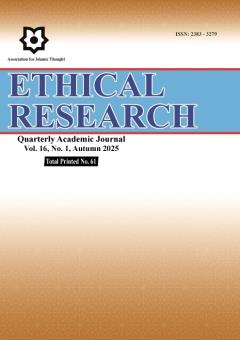The concept and components of moral education from Allama Jafari's point of view in order to provide a model of moral education
Subject Areas : اخلاق و تربیت اسلامیfarhad ranjbar 1 , Mohammad Hossein Heydari 2 , Seyed Hossein Vaezi 3
1 -
2 -
3 -
Keywords: education, moral education, model of moral education, Allameh Jafari.,
Abstract :
The present research explains and analyzes the characteristics of education from the point of view of Allameh Mohammad Taghi Jafari. Allameh Jafari is the author of a theory that his educational opinions are derived from the Qur'an, Nahj al-Balagha, and sometimes Masnavi al-Masnavi. The basic problem of the existing research The results indicate that the principles and methods of moral education include life, rationality, thinking and reasoning, strengthening beliefs in moral education, the place of encouragement and punishment in moral education, benefiting from lofty thoughts, responsibility in moral education, creativity. finding, and cultivating it and paying attention to the values and culture of the society. The method of doing the work is qualitative content analysis. The sources to be reviewed and studied include books, magazines, articles and lectures. The main goal of training human beings who are thinkers, researchers, progressives, scholars, religious, transgressors and are adorned with moral virtues to achieve insight, happiness, and righteous society in personal and social affairs, which is to achieve the original goal of human life, which is nearness to God and It will contain the morals of Allah. From the point of view of the teacher, he is the first and truest teacher and trainer of God, so man should ask him for the qualification of the position of God's representative. Also, in the discussion of teacher and coach, they have mentioned three dimensions, including the machine dimension, the non-machine dimension, the super-machine dimension or the spiritual dimension, and Professor Jafari accepts the super-machine dimension or the spiritual dimension.
ایزدی، صمد؛ قادری، مصطفی؛ حسین، فاطمه ؛ (1390) برنامه درسی معنوی به عنوان یکی از حلقه های بنیادین، تربیت اسلامی.
حیدری، محمدحسین (1389) سیری در آراء تربیتی علامه محمدتقی جعفری، ماهنامه معرفت، سال پانزدهم، شماره 104.
داودی، محمد (1389). تربیت اخلاقی قم: پژوهشگاه حوزه و دانشگاه.
ملکی، حسن (1389) تعلیم و تربیت اسلامی با رویکرد کلان نگر. تهران: انتشارات عابد.
دورانت ویل (1387) تاریخ تمدن، ترجمه اسماعیل دولت شاهی، تهران: انتشارات علمی فرهنگی.
شکوهی یکتا، محسن (1380) تعلیم و تربیت اسلامی (مبانی و روشها) تهران: شرکت چاپ و نشر ایران.
Siegel. H. (2006). Cultivating reason. In Randall Curren (ed.). A companion to the philosophy of education (305-319). Oxford Blackwell publishing.
الیاس، جان (1385). فلسفه تعلیم و تربیت (قدیم و معاصر). ترجمه عبدالرضا ضرابی. قم: مؤسسه آموزشی و پژوهشی امام خمینی(ره).
باقري، خسرو (1368). نگاهی دوباره به تربیت اسلامی. تهران: انتشارات مدرسه.
جعفري، محمد تقی (1374). ترجمه و تفسیر نهج البلاغه. تهران: انتشارات دفتر فرهنگ و اندیشه اسلامی.
جعفری، محمد تقی (1374) ترجمه و تفسیر نهج البلاغه، تهران: انتشارات دفتر فرهنگ و اندیشه اسلامی
مطهری، مرتضی (1361) مجموعه آثار شهید مطهری، ج 5، قم، صدرا
مجلسی، محمدباقر (1404) بحارالانوار، ج 27، بیروت: موسسه دارالوفاء.


